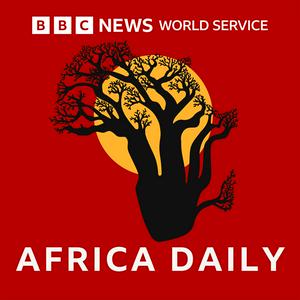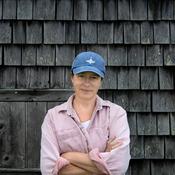1142 episodes

Tanzanian elections: What issues are young people concerned about?
2025/10/27 | 33 mins.
As Tanzania gears up for elections on 29 October, we hear from two young people about the issues that matter to them and whether youth concerns have been featured in the electoral campaigns.How a young Senegalese footballer's dream of joining a professional club ended in tragedy after he was tricked and lured to Ghana by fake football agents.And how Africa is rapidly becoming a compelling destination for outsourcing services.Presenter: Nyasha Michelle Producers: Mark Wilberforce, Stefania Okereke, Sunita Nahar and Yvette Twagiramariya Technical Producer: Craig Kingham Senior Producer: Patricia Whitehorne Editors: Maryam Abdalla and Sam Murunga

Focus on Africa: Hundreds of stolen social media identities used to spread propaganda
2025/10/23 | 32 mins.
A BBC investigation uncovers dozens of social accounts using stolen identities of Somali and Muslim influencers and posting political propaganda content. We hear more about what was uncovered and who might be behind this widespread operation.Chad’s parliament has overwhelmingly approved a controversial constitutional amendment removing presidential term limits. What will this mean for 41-year-old President Mahamat Idriss Deby’s hold on power?And why the Kenyan Catholic Church took the decision to introduce a new brand of altar wine.Presenter: Nyasha Michelle Producers: Mark Wilberforce, Stefania Okereke, Sunita Nahar and Elphas Lagat Technical Producer: Gabriel O'Regan Senior Producer: Patricia Whitehorne Editors: Maryam Abdalla and Sam Murunga

Focus on Africa Can DRC be declared ebola free?
2025/10/21 | 29 mins.
The last ebola patient in the Democratic Republic of the Congo has been released from a treatment centre in Kasai province. Can the country now be declared free of this latest outbreak?What is behind the escalating tensions between Ethiopia and Eritrea over control of the Red Sea?And we hear from the Nigerian scientist, who has been recognised with a global award from the International Institute of Tropical Agriculture, on how her pioneering work is protecting yam and cassava crops and making them more resilient.Presenter: Nyasha Michelle Producers: Mark Wilberforce, Yvette Twagiramariya, Stefania Okereke and Alfonso Daniels Technical Producer: Chris Kouzaris Senior Producer: Patricia Whitehorne Editors: Andre Lombard and Alice Muthengi

Focus on Africa: What led to the downfall of Madagascar's president
2025/10/15 | 32 mins.
An elite military unit says it has seized power in Madagascar from President Andry Rajoelina following weeks of youth-led protests. Where did it all go wrong for the entrepreneur and former DJ, who first became president in 2009 when he was just 34.Being a park ranger in Africa can be one of the most dangerous professions in the world. We hear from a ranger at Zambia's South Luangwa National Park, who, with a group of others, has picked up an international award for his work.And Ghana’s iconic kente cloth has been officially recognised and granted protected status as a national heritage fabric.Presenter: Nyasha Michelle Producers: Yvette Twagiramariya, Mark Wilberforce, Alfonso Daniels and Ryan Johnson Technical Producers: Chris Kouzaris and Sarah Kimberley Senior Journalist: Patricia Whitehorne Editors: Andre Lombard and Alice Muthengi

Focus on Africa: Militants' blockade paralyses Mali-Senegal trade corridor
2025/10/13 | 38 mins.
Mali's military government is reportedly engaged in talks with the militant group Jamaat Nusrat al-Islam wal-Muslimin (JNIM) amid an ongoing blockade which has paralysed a key trade route for fuel, food, and essential goods. Could the crisis also threaten Mali’s stability and governance?A BBC Africa Eye investigation in Cape Town, South Africa, reveals how self-appointed healers and shamans are openly using psychedelic drugs as part of treatment for mental health issues.And if you are in a relationship, do you have 'a swag gap'? We hear more about the new phrase that is going viral on social media and whether being more stylish and confident than your partner can be a deal breaker.Presenter: Nyasha Michelle Producers: Yvette Twagiramariya, Stefania Okereke, Mark Wilberforce and Joseph Keen Technical Producer: Chris Kouzaris Senior Journalist: Patricia Whitehorne Editors: Andre Lombard and Alice Muthengi
More News podcasts
Trending News podcasts
About Africa Daily
Listen to Africa Daily, The Daily and many other podcasts from around the world with the radio.net app

Get the free radio.net app
- Stations and podcasts to bookmark
- Stream via Wi-Fi or Bluetooth
- Supports Carplay & Android Auto
- Many other app features
Get the free radio.net app
- Stations and podcasts to bookmark
- Stream via Wi-Fi or Bluetooth
- Supports Carplay & Android Auto
- Many other app features


Africa Daily
download the app,
start listening.




































